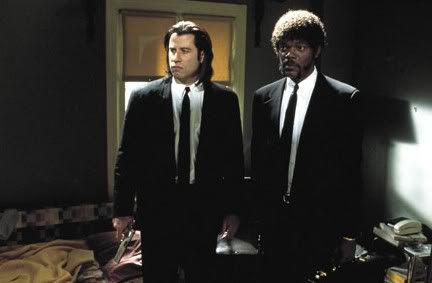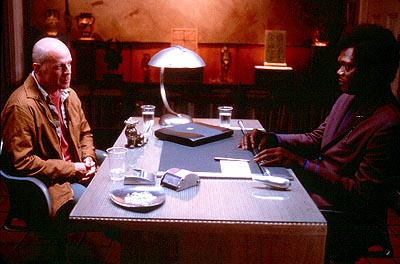The cracks in S.H.I.E.L.D.
Every time a Marvel film is released, an altogether new reason arises for DC people to tremble in their complacent seats, and "Captain America: The Winter Soldier" is just the kind of Marvel project to make them all apprehensive (and more) while they try and cram almost everything under the sun in that upcoming "Batman/Superman" film. If DC, as of now, is an image of inconspicuous pressure because they're still quite unsure about what to do with their product, Marvel, in comparison, is kind of like the scout leader who's as organized and assured as all hell.
In all honesty, "Captain America: The Winter Soldier", in terms of its storyline, does not really feel like a superhero movie but more like a stoic political thriller. And though it's being considered by many as the best solo Marvel film to date (some even consider it highly superior to "The Avengers" itself), some may also argue that the reason it became such a quality movie was because it really didn't try to be a superhero film in the classical sense. Its conflict, for instance, doesn't materialize from a formidable villain who wants to proverbially take over the world but from within the ranks of the titular hero himself. So, basically, what makes "Captain America: The Winter Soldier" so great is that it highly contradicts the notion raised by Joss Whedon's "The Avengers" that everything is well and good within the conspiracy-crushing, Chitauri-manhandling organization that is S.H.I.E.L.D. If "The Avengers" is the seminal sing and dance for Cap and company, "Captain America: The Winter Soldier" is the part where the music suddenly stops. And if the said ensemble superhero film is the colorful celebrity magazine, "Captain America: The Winter Soldier" is freakin' WikiLeaks. The S.H.I.E.L.D., as expected, is really not what it seems to be, and Captain America, the symbolic super-soldier representing pride, honor, and all the other positive adjectives you can possibly think of, is predictably dead set in getting to the bottom of it, and the result's explosive in every sense of the word.
Chris Evans, who we formerly knew as the 'Human Torch' guy who just happened to nab the Steve Rogers role (many were skeptic about him back then), has firmly grown in the role, with him getting better at it with every film. In "Captain America: The First Avenger", he was believable as the likable misfit who suddenly becomes a dependable (not to mention indestructible) super-soldier whose orders American soldiers eagerly anticipate.
In "The Avengers", he has shown that a pretty boy like him can confidently bark orders at the likes of Robert Downey, Jr. and hold his own ground against Samuel L. Jackson in an on-screen argument. Here in "Captain America: The Winter Soldier", Evans has delivered his most multifaceted performance to date as the patriotic, U.S. flag-clad superhero by emphasizing the fact that Steve Rogers is as wary of the present as he is haunted by his past. And that despite his seemingly all too perfect track record as an unreal specimen of a foot soldier who gets things done, he is all too puny compared to the entire conspiracy that's slowly poisoning the S.H.I.E.L.D. from the inside.
Evans, who's now relatively edgier in the role, was able to makes us believe in this film, in all his facial expressions and displays of physical struggle, that this may just be the first time an Avenger will be vanquished. Even Nick Fury, who we all consider as this eye-patched badass who does nothing more than eagerly watch the Avengers' every move behind closed doors and on computer screens, was fleshed out in a way that makes one think that this entire Marvel Cinematic Universe, if stripped down to the characters' bare essences, is basically a series of films starring a bunch of head cases with a death wish who all just happen to want to save the world. And just like "X-Men: First Class", "Captain America: The Winter Soldier" effortlessly adopts an additional layer of complexity due to its dose of political intrigue.
Essentially, the film's dominant priority is to be a potent spy feature, and as a movie fan, it's just valid to label this film as an intense yet patient espionage thriller despite it starring one of the most unsubtle superheroes of all time. And just as we thought that the film's layered plot line is compelling enough, here then cometh the titular villain, played by a genuinely intimidating Sebastian Stan.
For comic book fans, it's common knowledge that the so-called 'winter soldier' is Bucky Barnes: Steve Rogers' best friend from years past. And for casual film fans, it's given that this is a great opportunity for the film to give proper focus on emotional exposition, which it just did in a fashion similar to "Star Wars", specifically the chemistry between Luke Skywalker and Darth Vader. Added bonus is the magnetic performance by Robert Redford, whose involvement in the Tony Scott-directed "Spy Game" legitimizes this 'superhero' film as an equally game spy picture that's very much at home in wrecking big-ass Helicarriers as it is confident in staging quiet, clandestine conversations within soundproof rooms.
In short, "Captain America: The Winter Soldier" is infinitely more than just an escapist fare because it has a little bit of everything (even Falcon's here!). With its non-campy seriousness and a serviceable lack of implausible humor (unlike the swords and punchlines epic that is "Thor: The Dark World"), this film officially makes it known that Marvel is indeed capable in producing not just great superhero films, but also great, well-written films, period. And if superhero films typically cram everything they can within the limitations of the climax, this film is seemingly unstoppable, as it unleashes one awesome setpiece after another while still fully preserving the integrity of its sophisticated narrative. Also, this teaches revisionist Hollywood of today that superhero films can appeal to modern audience without so much as darkening a single inch of the narrative or brooding up the main character's back story. Now, I wouldn't end this review with a tired "Your move, DC!" catchphrase because, as of this moment, there really is no rivalry. Marvel is at the top of the heap by a wide margin, and it will take more than the combined appeal of Batman and Superman to dethrone it. Marvel's bigger than U.S. Steel.
FINAL RATING











